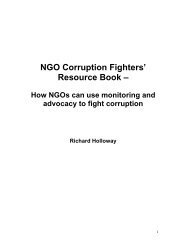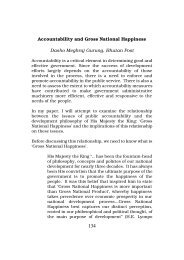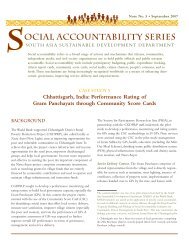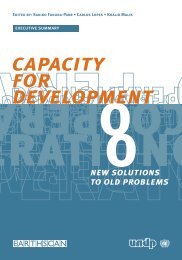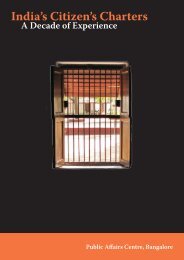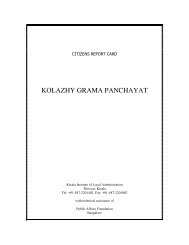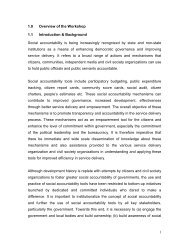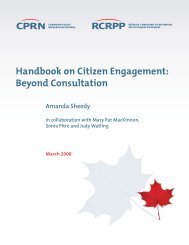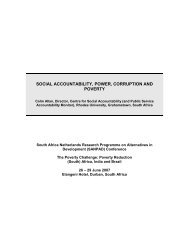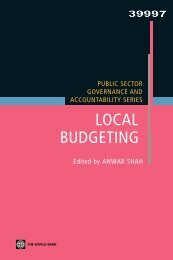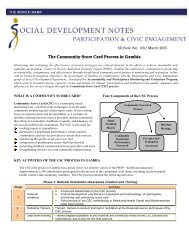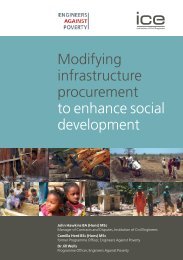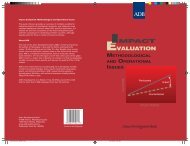Enabling Environment for Social Accountability in ... - SASANet
Enabling Environment for Social Accountability in ... - SASANet
Enabling Environment for Social Accountability in ... - SASANet
Create successful ePaper yourself
Turn your PDF publications into a flip-book with our unique Google optimized e-Paper software.
<strong>Social</strong> and cultural considerations also affect journalistic standards. For example, sports writers f<strong>in</strong>d it<br />
difficult to criticize players because they are personally familiar or socially connected with many of them.<br />
A mutual acqua<strong>in</strong>tance may request that the journalist refra<strong>in</strong> from a negative or unflatter<strong>in</strong>g account, as<br />
is also the case with politicians.<br />
Moreover, media owners, who are all politically l<strong>in</strong>ked, exercise close control over political content,<br />
which results <strong>in</strong> systemic biases <strong>in</strong> coverage. There are numerous accounts of editors who either refuse to<br />
carry content or <strong>in</strong>sist on a certa<strong>in</strong> slant to a story. Thus, even highly qualified journalists may face<br />
obstacles from their editors or the owners of the media outlet. In light of this, stakeholders have proposed<br />
tra<strong>in</strong><strong>in</strong>gs <strong>for</strong> owners and editors as well as journalists.<br />
Despite political slant<strong>in</strong>g <strong>in</strong> the media, both major political parties are supported by outlets from each<br />
media subsector. As a result, stakeholders repeatedly stated that they had to read numerous newspapers to<br />
get a composite picture. There are, however, signs that the political polarization of the broadcast media<br />
has decreased s<strong>in</strong>ce the 2004 parliamentary elections and that Mongolia Radio and Television, now<br />
PRTV, <strong>in</strong> particular, is becom<strong>in</strong>g less biased toward the government and rul<strong>in</strong>g party. Monitor<strong>in</strong>g of the<br />
media dur<strong>in</strong>g the 2005 presidential election campaign <strong>in</strong>dicated that MRTV had become far more<br />
balanced (Globe International 2004, 2005a, and 2005b; Press Institute 2004b:25-26). It should be further<br />
noted that politicization extends to various civil society actors <strong>in</strong> the media sector, who may, as a result of<br />
their own <strong>in</strong>volvement, fail to protest abuses of media freedom.<br />
Another concern is the concentration of the media such as the vertically <strong>in</strong>tegrated media empire<br />
controlled by Mongol News, as well as Igel’s grow<strong>in</strong>g network of local (aimag) newspapers (Press<br />
Institute 2004a). At present, there is no specific regulation on the concentration of ownership <strong>in</strong> the media<br />
sector or any proposal <strong>for</strong> such a legal re<strong>for</strong>m.<br />
The crim<strong>in</strong>al and civil laws are the primary means <strong>for</strong> redress<strong>in</strong>g harmful media content. However, this<br />
<strong>for</strong>m of redress is <strong>in</strong>accessible <strong>for</strong> most Mongolians as it is a lengthy, expensive, and unreliable process.<br />
On the other hand, when powerful economic or political actors <strong>in</strong>itiate cases, the consequences are<br />
oppressive <strong>for</strong> the media outlets and <strong>for</strong> the journalists. In many countries, self-regulatory or statutory but<br />
<strong>in</strong>dependent bodies receive compla<strong>in</strong>ts from the public who claim to have been adversely affected by<br />
media content. The idea of a self-regulatory press council has been discussed <strong>for</strong> some time <strong>in</strong> Mongolia,<br />
but the serious divisions with<strong>in</strong> the media community have prevented any susta<strong>in</strong>able <strong>in</strong>itiative from<br />
emerg<strong>in</strong>g. 102 There is also discussion about a statutory press council, although there are some concerns<br />
regard<strong>in</strong>g the possibility of official <strong>in</strong>terference or control because, as one CSO leader noted, it is “the<br />
GoM and politicians who have politicized the media, result<strong>in</strong>g <strong>in</strong> the poor quality of the media.”<br />
A major obstacle to establishment of such a council is the serious lack of solidarity that permeates the<br />
media sector, which also h<strong>in</strong>ders the ability of journalists and media owners to stand up <strong>for</strong> freedom of<br />
the press and their rights as media workers. In a 2004 Globe International survey, 50 percent of journalists<br />
<strong>in</strong>dicated that the sector needs a strong organization to project its rights and <strong>in</strong>terests. A lack of such an<br />
organization was cited as the most common cause of self-censorship.<br />
102 In the 2004 Globe International survey, 47.5 percent of journalists called <strong>for</strong> a system of self-regulation to improve ethical<br />
report<strong>in</strong>g. In that same year, the Open Society Forum and Globe International worked with various media groups to establish a<br />
temporary press jury to hear compla<strong>in</strong>ts about coverage of the 2004 parliamentary elections <strong>for</strong> the three months lead<strong>in</strong>g up to the<br />
elections.<br />
97



